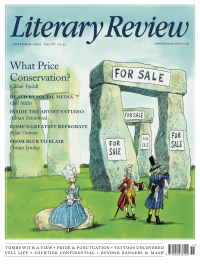Daniel Rey
It’s the Way You Tell It
The Word: On the Translation of the Bible
By John Barton
Allen Lane 320pp £25
Is there a harder text to translate than the Bible? Its scores of books were written in ancient languages, different literary styles, distinct historical settings and varying geographical locations. Its contents date from the beginning of the tenth century BC to the beginning of the second century AD, and it contains archaic genres such as prophecy.
Translating the Bible is not only uniquely complex but also consequential. For millennia, Christians have regarded translating the word of God as a divine task. Perhaps that’s why no book has been translated more often and into more languages. The precedent is in the text itself: Jesus of Nazareth spoke in Aramaic and his followers – eager to spread his message in the lingua franca – preserved his teachings in Greek. When we read Jesus’s words in our language, we are reading a translation of a translation.
In The Word, John Barton analyses the complexities involved in the process and demonstrates how (mis)translations of the Bible have shaped theology and history. Even before the biblical translator begins to parse the source text, there is a major obstacle: he or she must decide what that text is. Not only are there divergent manuscripts but, when it comes to the anthology Jews call the Hebrew Bible and Christians call the Old Testament, there are also competing languages and rival canons. The translator must decide whether to work from a Hebrew version that is in most cases the original or a Greek translation, known as the Septuagint, produced by Jews in the third century BC. The Septuagint includes books not in the Hebrew version. Furthermore, in some of the books it shares with the Hebrew Bible, it contains additional, older material.
This Greek translation of the Hebrew Bible was especially important in the establishment of Christian theology. There are doctrines concerning the nature of Christ that may not have been developed had New Testament authors read the Old Testament in Hebrew. One such emerged from the Nativity narrative in the

Sign Up to our newsletter
Receive free articles, highlights from the archive, news, details of prizes, and much more.@Lit_Review
Follow Literary Review on Twitter
Twitter Feed
The son of a notorious con man, John le Carré turned deception into an art form. Does his archive unmask the author or merely prove how well he learned to disappear?
John Phipps explores.
John Phipps - Approach & Seduction
John Phipps: Approach & Seduction - John le Carré: Tradecraft; Tradecraft: Writers on John le Carré by Federico Varese (ed)
literaryreview.co.uk
Few writers have been so eagerly mythologised as Katherine Mansfield. The short, brilliant life, the doomed love affairs, the sickly genius have together blurred the woman behind the work.
Sophie Oliver looks to Mansfield's stories for answers.
Sophie Oliver - Restless Soul
Sophie Oliver: Restless Soul - Katherine Mansfield: A Hidden Life by Gerri Kimber
literaryreview.co.uk
Literary Review is seeking an editorial intern.